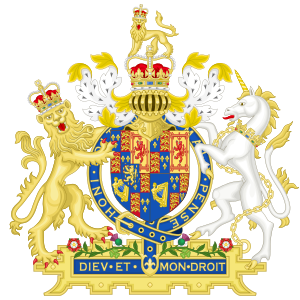| The charter granted by Their Majeſties King William and Queen Mary to the inhabitants of the province of the Maſſachuſetts-Bay, in New England | |
|---|---|
 Royal Coat of Arms of King William III and Queen Mary II | |
| Type | Royal Charter, Land Grant |
| Context | British colonization of the Americas Glorious Revolution Dissolution of the Dominion of New England |
| Signed | October 7, 1691 |
| Location | Westminster |
| Expiration | October 25, 1780 |
| Signatories | Sir George Hutchins Sir William Rawlinson Sir John Trevor |
| Language | English |
The Massachusetts Charter of 1691 was a charter that formally established the Province of Massachusetts Bay. Issued by the government of William III and Mary II, the corulers of the Kingdom of England, the charter defined the government of the colony, whose lands were drawn from those previously belonging to the Massachusetts Bay Colony, Plymouth Colony, and portions of the Province of New York. The territorial claims embodied in the charter also encompassed all of present-day Maine (some of which had been claimed by the Massachusetts Bay Colony), New Brunswick, and Nova Scotia.
The charter was approved by William and Mary on October 7, 1691, and established English rule of the colony by appointing a governor, deputy governor, and secretary, to be elected by members of the council.[1] It took away many of its rights of self-government that had previously been enjoyed by Massachusetts and Plymouth authorities, transitioning the power in Boston from elected to royally appointed governors.[2] William and Mary appointed Sir William Phips as the new governor.[3] The charter established freedom of worship for Christians (not including Roman Catholics, referred to in the charter as "Papists"[4]) and removed religious restrictions[which?] on voting.[3][5] The charter benefited the British economically by reserving the right of free fishery to British interests only.[6]
Towns across the colony grew in status as a result of the charter.[why?][7]
- ^ Schutz, John A. (5 June 1997). Legislators of the Massachusetts General Court, 1691-1780: A Biographical Dictionary. UPNE. p. 13. ISBN 978-1-55553-304-5. Retrieved 20 July 2012.
- ^ "Massachusetts Government Act". Historywiz.com. Retrieved 20 July 2012.
- ^ a b Ayers, Edward L.; Gould, Lewis L.; Oshinsky, David M. (1 January 2011). American Passages. Cengage Learning. p. 55. ISBN 978-0-495-90921-7. Retrieved 20 July 2012.
- ^ "The Charter of Massachusetts Bay - 1691". 18 December 1998.
and for the greater Ease and Encouragement of Our Loveing Subjects Inhabiting our said Province or Territory of the Massachusetts Bay and of such as shall come to Inhabit there Wee doe by these presents for vs Our heires and Successors Grant Establish and Ordaine that for ever hereafter there shall be a liberty of Conscience allowed in the Worshipp of God to all Christians (Except Papists) Inhabiting or which shall Inhabit or be Resident within our said Province or Territory
- ^ Finney, Jerald (30 August 2008). God Betrayed. Xulon Press. p. 230. ISBN 978-1-60647-541-6. Retrieved 20 July 2012.
- ^ United States Congress (1913). Congressional Edition. U.S. G.P.O. p. 2405. Retrieved 20 July 2012.
- ^ Wakelyn, Jon L. (2006). America's Founding Charters: Primary Documents of Colonial and Revolutionary Era Governance. Greenwood Publishing Group. p. 323. ISBN 978-0-313-33155-8. Retrieved 20 July 2012.